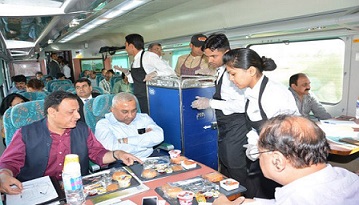To Watch On The Personal Safety Of Passengers:

Guard is the custodian, not only of passengers’ convenience and comfort but also, to a great extent, of their personal safety. Guard’s Duties in this regard may be discussed under:
- Hazardous habits of some passengers
- Safety gadgets provided on train
- Rendering of First Aid in the mishap.
Hazardous habits:
Certain practices which are fraught with dangerous possibilities have been prohibited under the Railway Act. The Guard should dissuade, whenever it comes to his notice, any passenger who might indulge in any of these dangerous practices.
In most cases, persuasion and careful explanation of the risk involved will help. But in case a passenger persists in such hazardous practices, the Guard should seek the assistance of the authorized protection force so that the passenger is prevented from opening him or others to risk.
Some of these practices are enumerated below:
- Entraining or Detraining a coach in motion or at unscheduled places:
Leaning out of windows or doors - Travelling on the roof, steps or footboards of any carriage or on an engine or in any other part of a train like luggage rooms not intended for the use of passengers
- Keeping an open light of fire or a lighted oil lamp or stove in a carriage
- Carrying offensive, dangerous, explosive and inflammable goods in a compartment.
Safety Gadgets:
To obtain the personal safety and security of passengers, Railways provide certain safety gadgets on trains. It is the duty of the Guard to see that these are in working order to this end, he is required to check these while taking over charge. These gadgets are
- Safety bolts and latches in the doors and windows
- Emergency exit windows in all the coaches
- Intercommunication chain in all the coaches
- Alarm chain communication chain in EMU/MEMU trains
- Passenger Emergency Alarm Signal Devices.
In case the emergency chain is pulled, the Guard should assume that either something untoward has happened or is about to happen and that one or more passengers are in need of his help. He should, therefore, be very quick in rendering such assistance.
First Aid:
If any passenger hurts or injures himself in any way, the Guard should promptly render first aid. In case of a serious injury or sickness or disease requiring expert medical attention, he should seek the assistance at a station ahead. Whatever service might have been rendered to a passenger at the station, its effect can be done away with if he is not kept happy on the train.
The longest period that a passenger spends on the railway is during the journey, and the attention and service that is bestowed on him during this period will naturally have the most lingering effect.The Guard, therefore, needs to be appreciated his duties as a public relations man from this point of view. If he discharges his responsibilities well, he will do a great service to the railways, in winning us the good-will of the users who travel on our passenger carrying trains.
